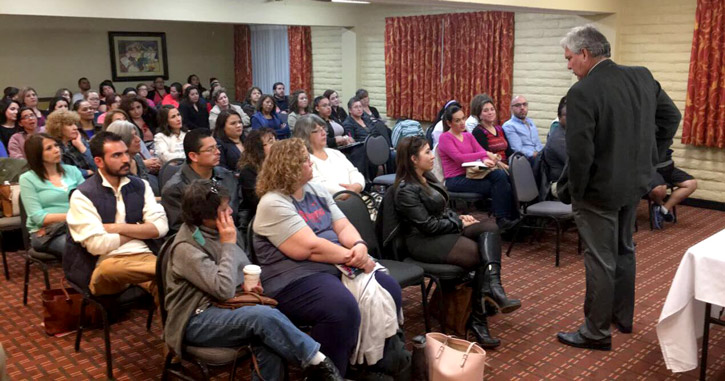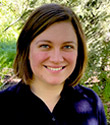Jul 10, 2024
Primary Care Providers Fill Rural Gaps in Autism Resources

For Kelley Dotson and her young patients in rural western Arkansas, three days of training changed everything.
Dotson, a pediatric primary care nurse practitioner in the small town of Mena, had practiced for 17 years with little knowledge or understanding of Autism Spectrum Disorder (ASD). Her education two decades earlier had touched on autism only briefly, during a 30-minute conversation in a class on chronic health conditions, and she'd had few opportunities to learn more about the condition since then. She was, in her own words, "woefully unprepared" to identify symptoms of ASD in young patients. And with the nearest developmental center more than two hours away in Little Rock, with a wait time of up to 18 months for an appointment, getting a diagnosis could be a long and difficult process for families in Mena and the surrounding rural areas — delaying treatment for children with ASD at an age when early interventions can be life-changing.
"I didn't know what to look for," Dotson recalled. "I really did not understand the subtle signs and symptoms of autism and how they present in children."
Then, in 2018, Dotson attended a training for a relatively new program out of the University of Arkansas for Medical Sciences (UAMS) — a program that, as Dotson put it, "opened up a whole new world." The Community-Based Autism Liaison and Treatment Project (CoBALT), a collaboration between the UAMS Department of Pediatrics and the Arkansas Department of Human Services, assembles and trains teams around the state — typically made up of a medical provider and a child development professional, such as a speech pathologist or psychologist — to screen and identify ASD in young children. The program aims to make screening more accessible to rural families, while cutting down on wait times for an official diagnosis at the state's main diagnostic center in Little Rock.
I didn't know what I didn't know…
"I didn't know what I didn't know until I went through the training," Dotson said. "It's made a dramatic difference for my practice, and has made a big difference in our corner of western Arkansas."
An estimated 1 in 36 children has ASD, according to the latest data from the Centers for Disease Control and Prevention's Autism and Developmental Disabilities Monitoring Network. Autism prevalence estimates have increased in recent decades, from an estimated 1 in 150 children in 2000. A growing awareness and evolved understanding of ASD have accompanied this increase in diagnoses — but in rural areas, specialists are often in short supply, and support and resources for caregivers are limited. To fill these gaps, primary care providers are using advanced training opportunities, online tools, and virtual networks to bring services to rural communities — while serving as connection hubs for people on the spectrum and their families.
"We have to think outside of the box: Who else can be trained who already resides in these areas and who we aren't using to their full potential?" said Samantha Ault, PhD, an Assistant Clinical Professor at The Ohio State University College of Nursing who studies interventions and support for children with ASD and their families in rural areas.
Building an understanding
Urban and rural primary care providers alike often lack a robust understanding of ASD and other developmental conditions, according to Kristin Sohl, MD, a pediatrician within the University of Missouri Health Care system and the founder of ECHO Autism, a Missouri-based national program that connects providers in rural communities with a team of specialists through virtual meetings. Typically, a three-year pediatrics residency will dedicate about a month to developmental conditions such as autism, Sohl said; family physicians and nurse practitioners often receive "far less" training than that.
In Arkansas, CoBALT was conceived after a pilot study by UAMS researchers found that approximately 6 out of 10 referrals to the university's James L. Dennis Developmental Center — the primary diagnostic center for autism in the state — were unwarranted, leading to an unnecessarily long waitlist for an appointment.
"There is data to suggest that if a child receives intervention as early as they can, then the hope is that for the long term, they will have better developmental outcomes," said Jaimie Flor, MD, Medical Director of the Dennis Developmental Center and Co-Director of the CoBALT program. "We don't want them to be sitting out there for so long that they miss out on crucial, crucial therapies that could help them catch up on their skills and make that progress that they need in order to grow and learn with their same-age peers."
As a pediatrician specializing in development and behavior, Sohl had noticed a backlog of patients waiting for a potential diagnosis at the University of Missouri's Thompson Center for Autism and Neurodevelopment, similar to the waitlist at the Dennis Center in Arkansas. But even without a long waitlist, accessing the center would still have been difficult for many rural families, Sohl realized. Making the long drive to the center in Columbia required parents to have a car, to be able to take time off work, and to have childcare for other siblings.
There are many people who, regardless of their desire to go to the cream-of-the-crop center, just can't get there.
"There are many people who, regardless of their desire to go to the cream-of-the-crop center, just can't get there," Sohl said. "It isn't right or fair to suggest that those people are just out of luck."
It was clear that a different approach was needed. So Sohl turned her energy toward a different strategy: working with providers to improve their understanding of autism, with the dual goal of narrowing down the center's waitlist and giving rural patients access to informed care closer to home.
"At the center, we would receive referrals that were anything from, 'I really do think this child has autism,' to 'I don't know what's going on, and I don't know what questions to ask, so can you do it?'" Sohl said. "We started to think about how we could expand capacity out into our rural… communities by elevating the skills of primary care physicians and clinicians to try to help them recognize the characteristics of autism more clearly."
'The desire, the ability, and the need' to do more
Sohl and her colleagues formed ECHO Autism in 2015 with the goal of helping primary care providers better understand how to screen for and identify characteristics of ASD; the program is based on the national Project ECHO Model, in which a virtual network of providers meets via video call to learn from expert specialists and discuss their own work amongst themselves. In the early years of ECHO Autism, it became clear that some participating providers had "the desire, the ability, and the need" to do more than screening and identification, Sohl said — so in 2016, she and her colleagues developed an early diagnostic model to equip primary care clinicians to diagnose the condition as well. Since then, the program has expanded to serve not only primary care providers, but other types of professionals such as licensed mental health clinicians.
While different types of professionals attend separate ECHO Autism meetings — mental health providers, for example, attend different meetings than primary care providers — the program has also connected these different types of professionals with each other. Participants living near one another — say, a primary care provider, mental health clinician, and speech therapist working in three different small towns within a 30-minute drive — have formed networks that the program refers to as ECHO Autism Communities.
The CoBALT program also relies on collaboration between different types of providers. Each of the eight teams across the state is made up of professionals and resources that were already in place in their communities — meaning each CoBALT team looks a little bit different. In Mena, the CoBALT team is made up of two primary care providers: Dotson and a physician colleague at the Rural Health Clinic (RHC) where she works. Potential teams are vetted by Flor and CoBALT co-director Jayne Bellando, PhD, before undergoing training, and remain in regular contact with program leaders after the training is completed.
Implementing CoBALT in Mena and other rural communities hasn't been without challenges, such as navigating reimbursement rates, building relationships with other primary care providers in the area for referrals, and carving out time from already-busy days for screening appointments. Screenings can take up to two hours, Bellando noted — no small time commitment for a primary care physician expected to see dozens of other patients each day.
"These are really special people and really special clinics because in many ways it's almost that they're donating their time," Bellando said. "It's almost like a ministry that they're doing for these children, and we hold them in great esteem for being able to do that."
Dotson often sees families who have traveled up to two hours for a CoBALT screening in Mena, she said, including some families from Oklahoma. Across the state, more than 2,000 children have been referred to CoBALT since 2016.
I know we've made a difference for these families.
"I think it's been very, very beneficial, especially for the rural areas," Dotson said. "I know we've made a difference for these families."
ECHO Autism has expanded to serve providers in a number of states, as well as in countries including Kenya and Vietnam. But Sohl sees some of the program's most meaningful impacts in her own state of Missouri, where it all began.
"It's been so cool to watch the providers fall in love with these kids," she said. "Now we can look back and say, 'Oh my gosh, do you remember when there were literally no pediatricians in the state who really knew what to do with autism from a primary care standpoint?' And now we're at around 80."
Hubs of support
As providers connect across Missouri and the world, in Santa Cruz County, Arizona, a rural county on the U.S.-Mexico border, families and children with ASD are connecting with each other. A support group for parents and caregivers of children with developmental disorders, started by the nonprofit Southern Arizona Autism Association and hosted at the Mariposa Community Health Center (MCHC), gives families in the region the opportunity to speak with specialists, learn how to navigate systems, and build a local support network of people who also understand the challenges of raising a child with ASD.
In Santa Cruz County, like in other rural communities, accessing autism services can be difficult: families must drive to Tucson, an hour away, for an official autism diagnosis or occupational therapy services, and the local speech therapist often has a waitlist of up to a year. Through the support group, parents and caregivers can meet with and receive training from professionals such as Applied Behavior Analysis (ABA) therapists and speech or occupational therapists, who come from nearby cities such as Tucson and Phoenix. These experts provide families with tools they can utilize at home, and help them formulate a plan for how and when to use them.

While the support group has existed for roughly a decade, it moved to the MCHC a year ago in an effort to more easily reach the center's patients, said Michelle Ramirez, a behavioral health technician at MCHC and president of the Southern Arizona Autism Association. The integrated nature of the MCHC — which houses medical, pediatric, and behavioral health services — allows patients with ASD and their caregivers to access multiple resources under one roof, from primary care to autism screening to art therapy to mental health counseling for both ASD patients and their caregivers.
"One of the cool things about [the support group] being here is that we get to talk to providers on a daily basis," Ramirez said. "They've been sending a lot of referrals to the support group."
Ault, who has studied the mental health of caregivers of children with ASD, says it's common for parents to put all of their energy into supporting their child, sometimes at the cost of their own wellbeing. Research suggests that support groups like the one in Santa Cruz County can help rural caregivers of children with ASD combat feelings of stress and social isolation — but in rural areas, these resources tend to be few and far between.
What I hear a lot from rural parents and caregivers is that they feel very isolated.
"What I hear a lot from rural parents and caregivers is that they feel very isolated," Ault said. "There might not be many families in their community that have a child with autism, and then the spectrum is so wide that their chances of finding another family dealing with similar challenges is slim. When I'm starting to work with some of these families, they'll often say, 'Wow, I thought I was the only one that was dealing with X, Y, and Z.'"
As a Certified Nurse Practitioner (CNP), Ault sees an opportunity for nurses, and particularly psychiatric nurse practitioners, to fill gaps in resources for rural families of children with ASD, from diagnostic and screening services to training and mental health support for caregivers.
The internet has also opened up new possibilities for supporting rural caregivers: Autism Toolkit, a new website created by researchers from the Mercer University School of Medicine in collaboration with the National Library of Medicine, provides information about ASD and ASD resources — from a map of providers to summer camp opportunities to links to recipes for people with food sensitivities — using feedback and questions submitted by users.
"When performing our autism and population health research, we kept hearing the same thing from rural Georgians: they wished there was an easy way for people without access to big-city resources to learn how to navigate autism," said Sarah Rotschafer, PhD, a faculty member at Mercer University and one of the creators of the Autism Toolkit, in a statement announcing its release.
As a mother to a 13-year-old son with ASD, Ramirez has experienced firsthand the shortage of resources in a rural community, and the difficulty and loneliness of navigating complicated systems to access those resources. She's also witnessed the growth of the Santa Cruz County support group over the past decade from five families to more than 3,000 families across the region, in Arizona and Mexico; while an estimated 50 families show up to each in-person meeting, many more join virtually to watch the expert presentations. She describes the support group as "a lifesaver" for families like hers — a chance for parents and caregivers to connect with others in an accepting environment, and a valuable opportunity for kids on the spectrum to socialize with their peers.
…we're there to share that light and support.
"The support group has helped tremendously, because you hear from other parents in a similar situation who have gone through it," Ramirez said. "They don't judge you; they understand. This all can be tricky for people to navigate, and it can feel like you've fallen into a big hole. But everyone there has been through that, and we're there to share that light and support."

